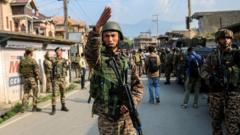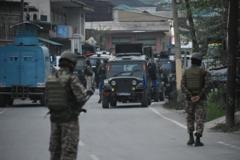As India launched an unprecedented military operation targeting multiple sites in Pakistan, experts suggest it could lead to significant repercussions.
### India-Pakistan Strikes: Tensions Rise as Responses Loom

### India-Pakistan Strikes: Tensions Rise as Responses Loom
The latest air strikes by India highlight escalating tensions between it and Pakistan, raising questions about potential retaliatory actions.
In a high-stakes sequence of events, India executed missile and air strikes early Tuesday, claiming to target militant positions across Pakistan and Pakistan-administered Kashmir. This operation, spanning around 25 minutes, was met with an aggressive response from Pakistan, which asserted that it had downed several Indian jets and reported casualties from the strikes. The strikes were reportedly in retaliation for a recent terrorist attack in Indian-administered Kashmir, indicating a critical rise in hostility between the two nuclear powers.
Indian officials claimed to have targeted nine locations linked to Pakistan-based militant groups, including Lashkar-e-Taiba and Jaish-e-Mohammed, deep within Pakistani territory. Historian Srinath Raghavan noted the broad scope of these strikes as a shift from India’s prior tactics, emphasizing that this strategy suggests multiple groups are now deemed as threats by India.
Ajay Bisaria, a former Indian diplomat, categorized the operation as a "Balakot plus response," intended to reinforce deterrence while also hinting at a need for de-escalation. This is significant as both nations navigate the risks of escalating military conflict. Experts predict that Pakistan will inevitably retaliate, despite some voices calling for restraint.
While some analysts express optimism for a potential diplomatic solution, the current situation is described as the most precarious between India and Pakistan since 2002. It’s believed that a miscalculation could spiral into a broader military conflict, especially as public sentiment and political dynamics in Pakistan could shift the military's posture.
In response to the air strikes, India has already undertaken considerable preventative measures, including closing border crossings and imposing restrictions on Pakistani nationals. Past crises have shown that overt military actions could lead to rapid escalation, yet a chance for diplomatic engagement remains as both nations confront the implications of their aggressive posturing.
Indian officials claimed to have targeted nine locations linked to Pakistan-based militant groups, including Lashkar-e-Taiba and Jaish-e-Mohammed, deep within Pakistani territory. Historian Srinath Raghavan noted the broad scope of these strikes as a shift from India’s prior tactics, emphasizing that this strategy suggests multiple groups are now deemed as threats by India.
Ajay Bisaria, a former Indian diplomat, categorized the operation as a "Balakot plus response," intended to reinforce deterrence while also hinting at a need for de-escalation. This is significant as both nations navigate the risks of escalating military conflict. Experts predict that Pakistan will inevitably retaliate, despite some voices calling for restraint.
While some analysts express optimism for a potential diplomatic solution, the current situation is described as the most precarious between India and Pakistan since 2002. It’s believed that a miscalculation could spiral into a broader military conflict, especially as public sentiment and political dynamics in Pakistan could shift the military's posture.
In response to the air strikes, India has already undertaken considerable preventative measures, including closing border crossings and imposing restrictions on Pakistani nationals. Past crises have shown that overt military actions could lead to rapid escalation, yet a chance for diplomatic engagement remains as both nations confront the implications of their aggressive posturing.





















